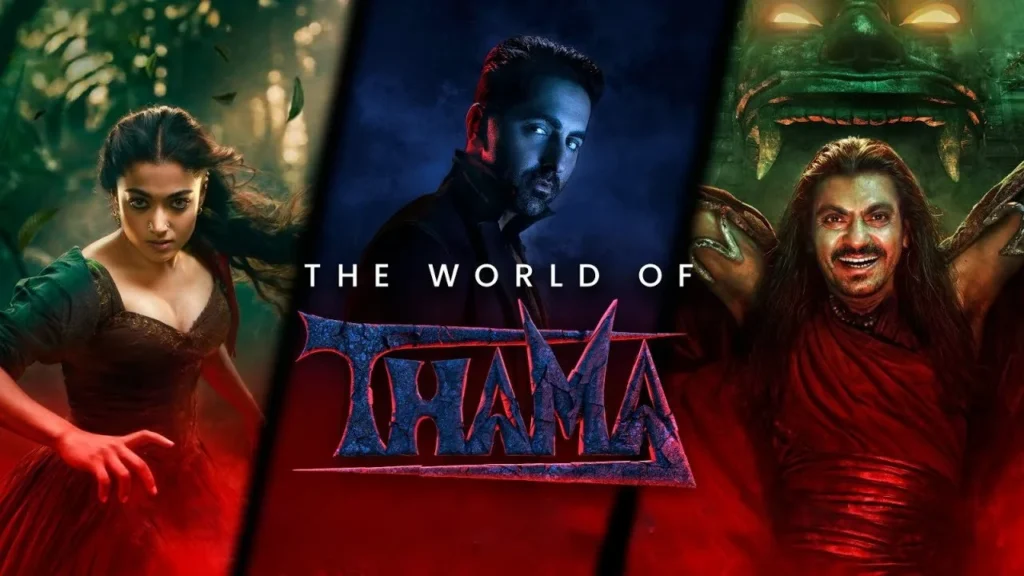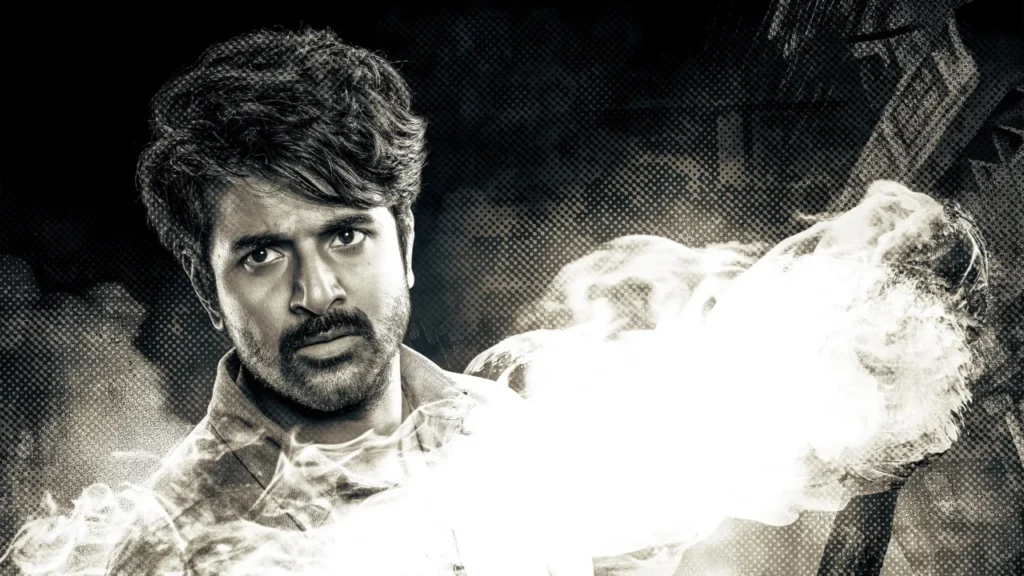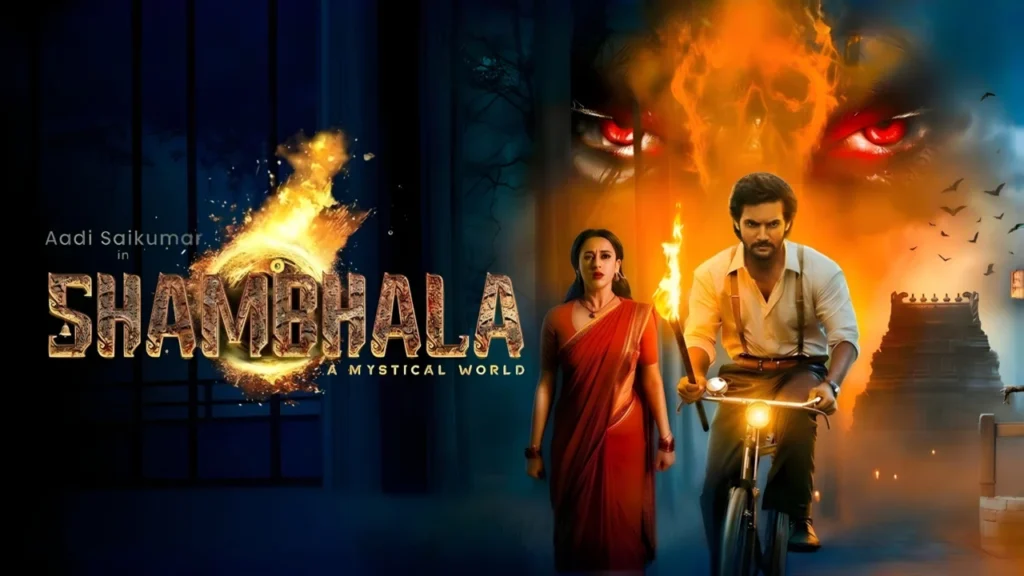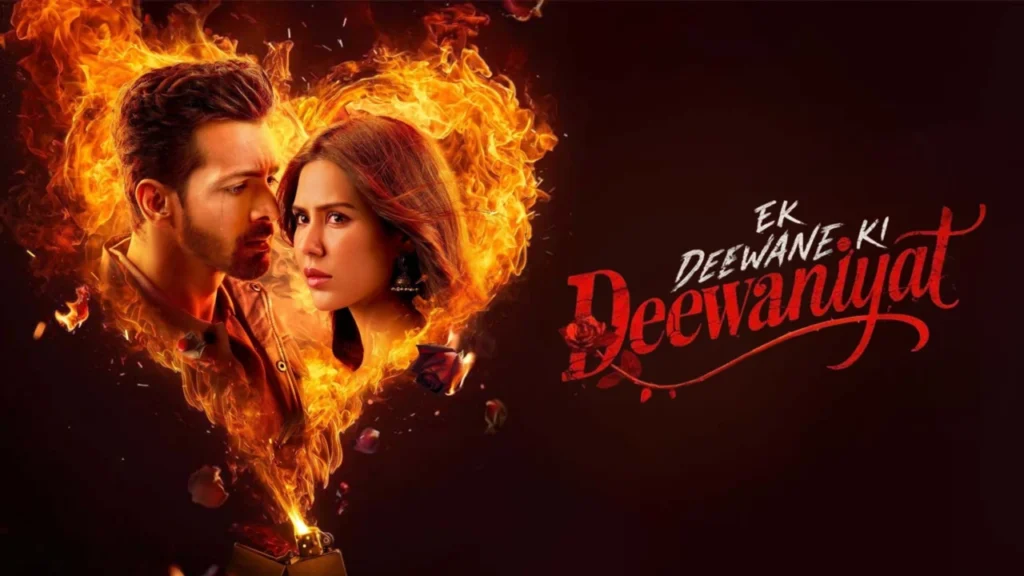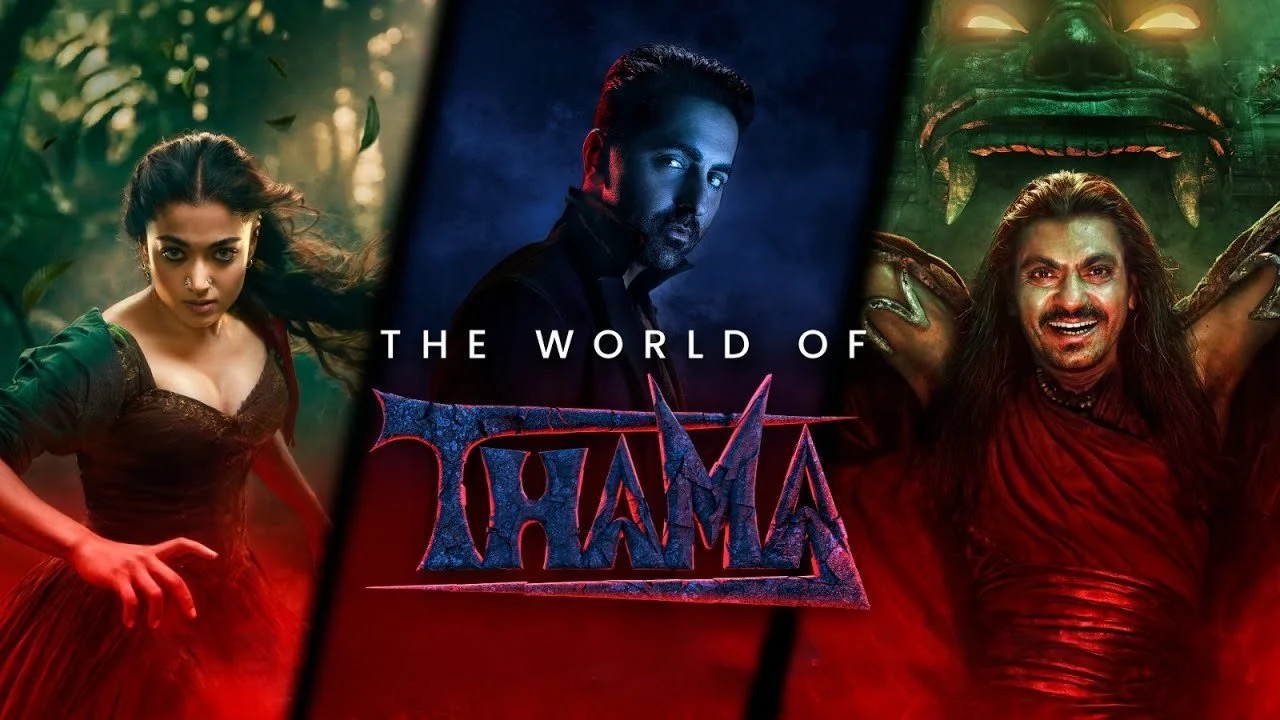
Thamma (2025) Movie: Rashmika’s Vampire Role Outshines the Film Itself
Maddock Films returns with their latest supernatural offering, Thamma, starring Ayushmann Khurrana and Rashmika Mandanna. Released this Diwali, the film marks the universe’s first proper dive into vampire territory. Aditya Sarpotdar directs this romantic horror-comedy that tries balancing multiple genres with varying success.
Unlike the studio’s earlier successes, this one leans heavier into romance than scares. The result feels uneven despite committed performances from the leads. While there’s ambition here, the execution stumbles more than it soars.

Plot That Promises More Than It Delivers
We start with Alok, a struggling reporter played by Ayushmann, who ventures into dangerous forest territory for a story. A bear attack nearly ends him before Tadaka appears. Rashmika plays this enigmatic vampire who rescues him, sparking an unlikely connection between mortal and immortal worlds.
Their relationship forms the emotional center as Alok discovers a hidden society of Betaals. These aren’t your typical blood-sucking monsters. They’re creatures from Indian folklore with their own rules and hierarchy. Nawazuddin Siddiqui’s Yakshasan serves as the big threat, though the character never gets room to truly menace.
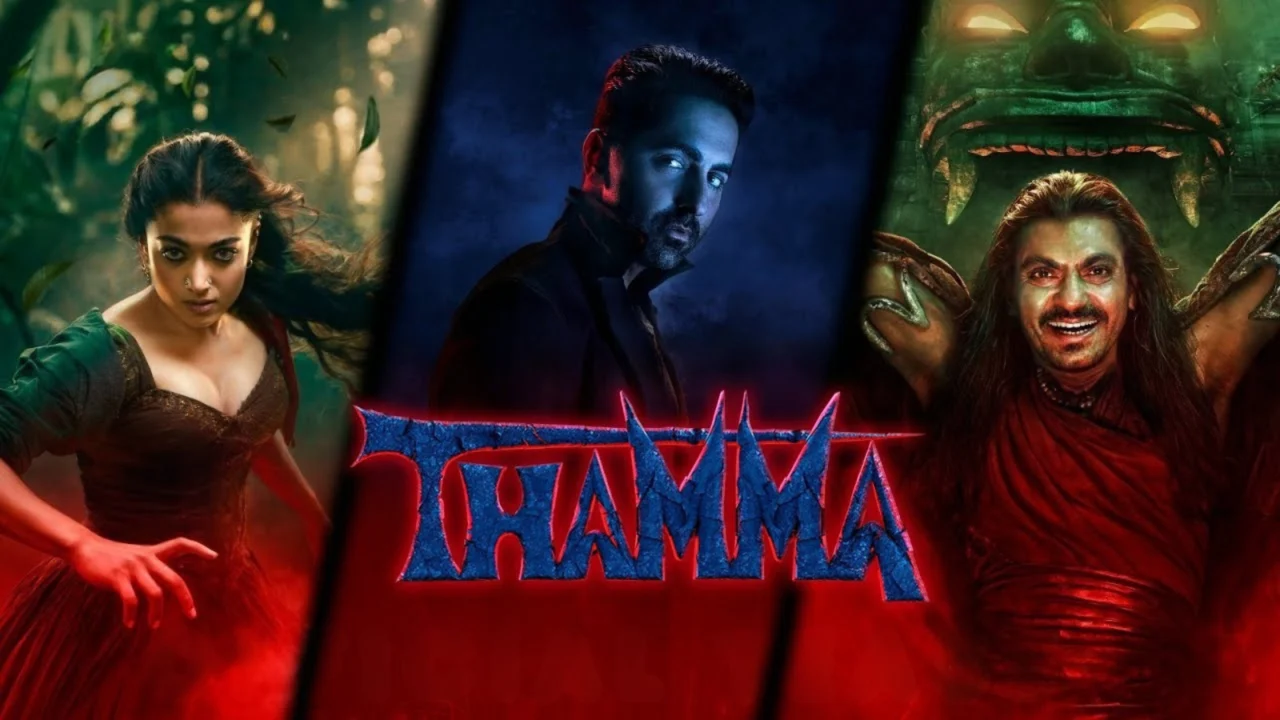
Acting That Elevates Weak Material
Rashmika Mandanna surprises with her most challenging Bollywood role yet. She brings real physicality and vulnerability to Tadaka. The character could’ve been one-note, but Rashmika finds layers others might’ve missed. Watching her balance the monster and the woman underneath kept me invested when the plot wandered.
Ayushmann Khurrana remains reliable as always. He sells the everyman-turned-supernatural-being arc convincingly. His transformation scenes carry weight because he commits fully. The humor doesn’t always land, but that’s on the writing, not his delivery. I believed his journey even when the screenplay made questionable choices.
Paresh Rawal owns every moment he appears. As Alok’s concerned father, he grounds the fantasy with genuine emotion. His reactions to his son’s changes feel authentic. The comedy that works best comes through him rather than the forced vampire gags. He’s the MVP here.
Nawazuddin Siddiqui deserved so much better. They cast one of Hindi cinema’s finest actors and barely use him. His villain never feels threatening because we hardly see him. What little screen time he gets shows flashes of brilliance. It’s frustrating to watch talent wasted this badly.
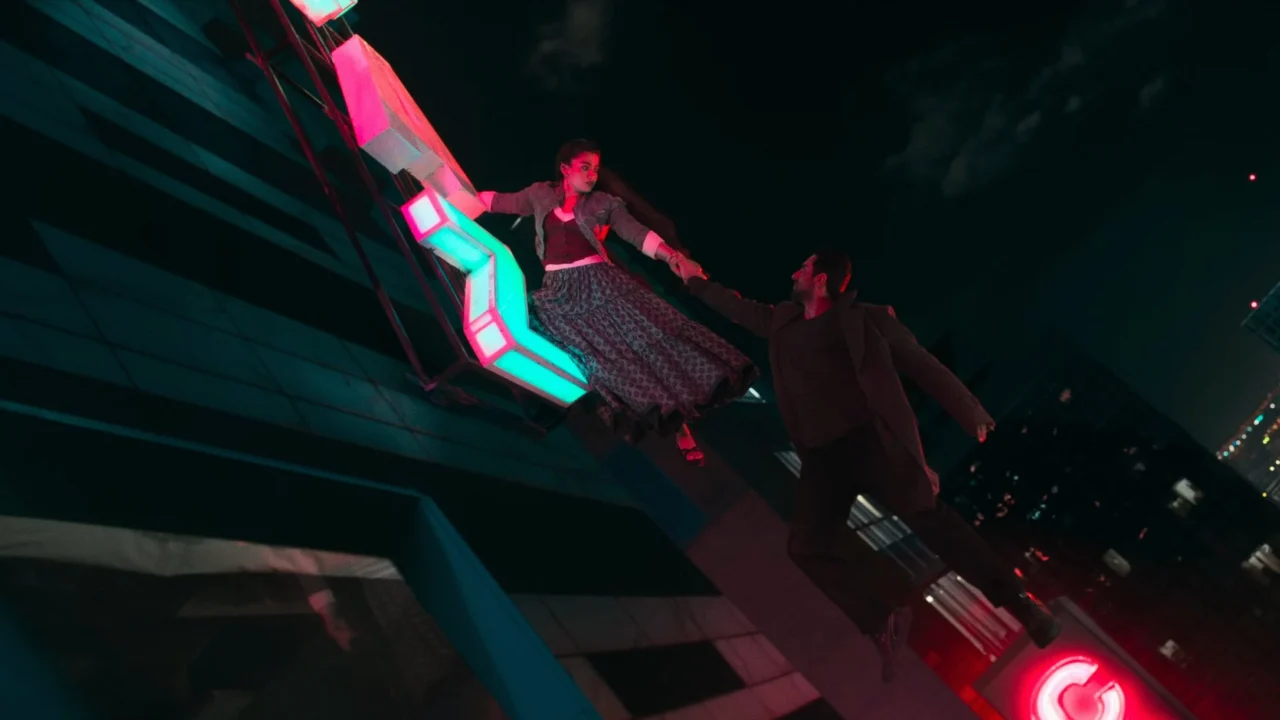
Technical Wins and Losses
The visual effects impress in key moments. Ayushmann’s transformation looks appropriately unsettling. The fight between him and Varun Dhawan’s Bhediya delivers genuine thrills. These sequences show what the film could’ve been with a tighter focus. Some effects feel rushed though, particularly in wider action shots.
Sachin-Jigar’s soundtrack misses the mark this time. The songs interrupt rather than enhance. I found myself checking my watch during musical numbers. Poison Baby featuring Malaika Arora feels especially out of place. Cutting two songs would’ve helped pacing immensely.
Where Things Fall Apart
The pacing kills momentum repeatedly. The first hour moves at a crawl, setting up romance that takes forever to click. We wait too long for supernatural elements to kick in properly. By the time things get interesting, we’re halfway through the runtime. I kept hoping for tighter editing throughout.
Repetitive humor becomes a real problem. The vampire jokes that work initially get beaten to death. The screenplay recycles the same bits expecting different results. Comedy needs surprise, but this film telegraphs every punchline. The second half especially drags when it should accelerate.
The climax disappoints after all that build-up. It rushes through conflicts that needed proper development. Major character decisions happen without earning them dramatically. I wanted to feel something powerful, but the resolution felt mechanical. It’s like they ran out of ideas and just wrapped things up.
Critical Reception Tells the Story
Bollywood Hungama praised it as solid entertainment, awarding 4 stars. They appreciated how it expands the franchise. Times of India gave 3.5 stars, highlighting the performances and visual flair. Firstpost, Times Now, and Bollyflix all landed on 2.5 stars, noting ambition hampered by execution issues.
News18 felt disappointed with 3 stars, saying the film played things too safe. Public response on IMDb sits at 6.5, reflecting the divided opinion. Franchise fans seem more forgiving than general audiences. Everyone agrees Rashmika stands out, but opinions split on whether that’s enough.
The consensus points to a film with good intentions that loses its way. Critics praised individual elements while finding fault with the whole. That pattern continued with audience reactions too.
My Final Thoughts
Walking out, I felt conflicted. There’s genuine craft on display here. Rashmika’s performance alone justifies watching. The mythology draws from interesting sources. The universe-building shows potential for future installments. But none of that excuses the bloated runtime or weak storytelling.
I wanted this to succeed. The cast deserved better material. The concept had room for something special. Instead, we get a film that can’t decide what it wants to be. The romance works in spurts. The horror barely registers. The comedy grows stale. It’s not bad enough to dismiss but not good enough to recommend strongly.
Fans invested in this expanding universe will find value in the connections made. Casual viewers might wonder what the fuss is about. I fall somewhere in the middle. There’s enough here to appreciate without loving the final product. It’s the definition of a mixed bag.
Rating: 2.75/5

